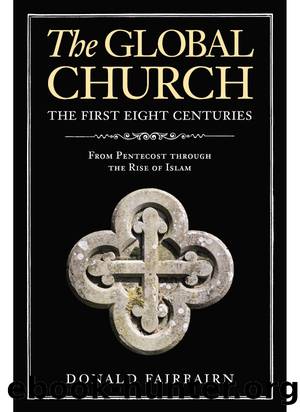The Global ChurchâThe First Eight Centuries: From Pentecost Through the Rise of Islam by Donald Fairbairn

Author:Donald Fairbairn [Fairbairn, Donald]
Language: eng
Format: epub
Publisher: Zondervan
Published: 2021-03-02T00:00:00+00:00
CONCLUDING REFLECTIONS
Many Protestants generally have a negative, or at least suspicious, attitude toward monasticism. The Reformers of the sixteenth century reacted strongly against the exaltation of celibacy as a higher Christian calling than marriage, and if anything, they and we have embraced marriage as a higher calling than singleness. It is also easy for us to charge monasticism with a lack of concern for the broader church and the world. To the Reformers and to us, monastics seem to be the Christians most guilty of subscribing to works salvation, and thus we tend to think that the entire monastic enterprise constitutes a denial of justification by faith. Now that we have looked at the early history of monasticism, it is worth considering these common Protestant criticisms.
First, it is certainly true that monasticism has regarded and regards celibacy as a higher calling than marriage. It is hardly alone in that regard. From the beginning of Christian history up to the present, most branches of the church have required celibacy not merely of monastics, but also of their highest-ranking church officials.34 Most Protestants simply disagree with this attitude, as well we should. At the same time, though, we should recognize that we may have made the opposite mistake of regarding marriage as a higher calling than singleness. Marriage is certainly the normal calling in which adult believers serve the Lord, but clear eyes should be able to see that it is not inherently more spiritual than singleness. Christians have often failed to accept both marriage and singleness as appropriate vocations, each with its own spiritual advantages and pitfalls, but neither inherently more spiritual than the other. The church has always tended to create a class system and to regard certain believers as top tier and others as second class. The patristic church (and, for that matter, the non-Protestant churches today) can justly be criticized for exalting celibacy over marriage, but it is no less a problem when Protestants sometimes make singleness into a second-class way of serving the Lord.
Second, I hope this chapter has shown that the common Protestant perception of monastics as being unconcerned for the church and the world is simply not accurate. Perhaps the popular perception was and is that people leave the world to join a monastery because they are concerned only about their own salvation, but the women and men who actually carry out the monastic task have long seen their lives as being lived for the church and for the world, not in opposition or indifference. At the very least, they have sought to inspire the church through the example of a noble form of Christian community. Beyond this, monasticism has served the church and the world through business, scholarship, education, and, most important, evangelism and mission work. Indeed, as we will see later in this book, much of the Christian churchâs expansion from about the year 400 onward has been accomplished by monks. On this point our common Protestant perception is based on a misunderstanding.
Third,
Download
This site does not store any files on its server. We only index and link to content provided by other sites. Please contact the content providers to delete copyright contents if any and email us, we'll remove relevant links or contents immediately.
The Secret Power of Speaking God's Word by Joyce Meyer(3182)
Signature in the Cell: DNA and the Evidence for Intelligent Design by Stephen C. Meyer(3131)
Real Sex by Lauren F. Winner(3014)
The Holy Spirit by Billy Graham(2944)
The Gnostic Gospels by Pagels Elaine(2527)
Jesus by Paul Johnson(2352)
Devil, The by Almond Philip C(2325)
23:27 by H. L. Roberts(2248)
The Nativity by Geza Vermes(2227)
Chosen by God by R. C. Sproul(2161)
All Things New by John Eldredge(2159)
Angels of God: The Bible, the Church and the Heavenly Hosts by Mike Aquilina(1957)
The Return of the Gods by Erich von Daniken(1943)
Angels by Billy Graham(1922)
Knowing God by J.I. Packer(1854)
Jesus of Nazareth by Joseph Ratzinger(1811)
The Gnostic Gospel of St. Thomas by Tau Malachi(1793)
Evidence of the Afterlife by Jeffrey Long(1786)
How To Be Born Again by Billy Graham(1778)
